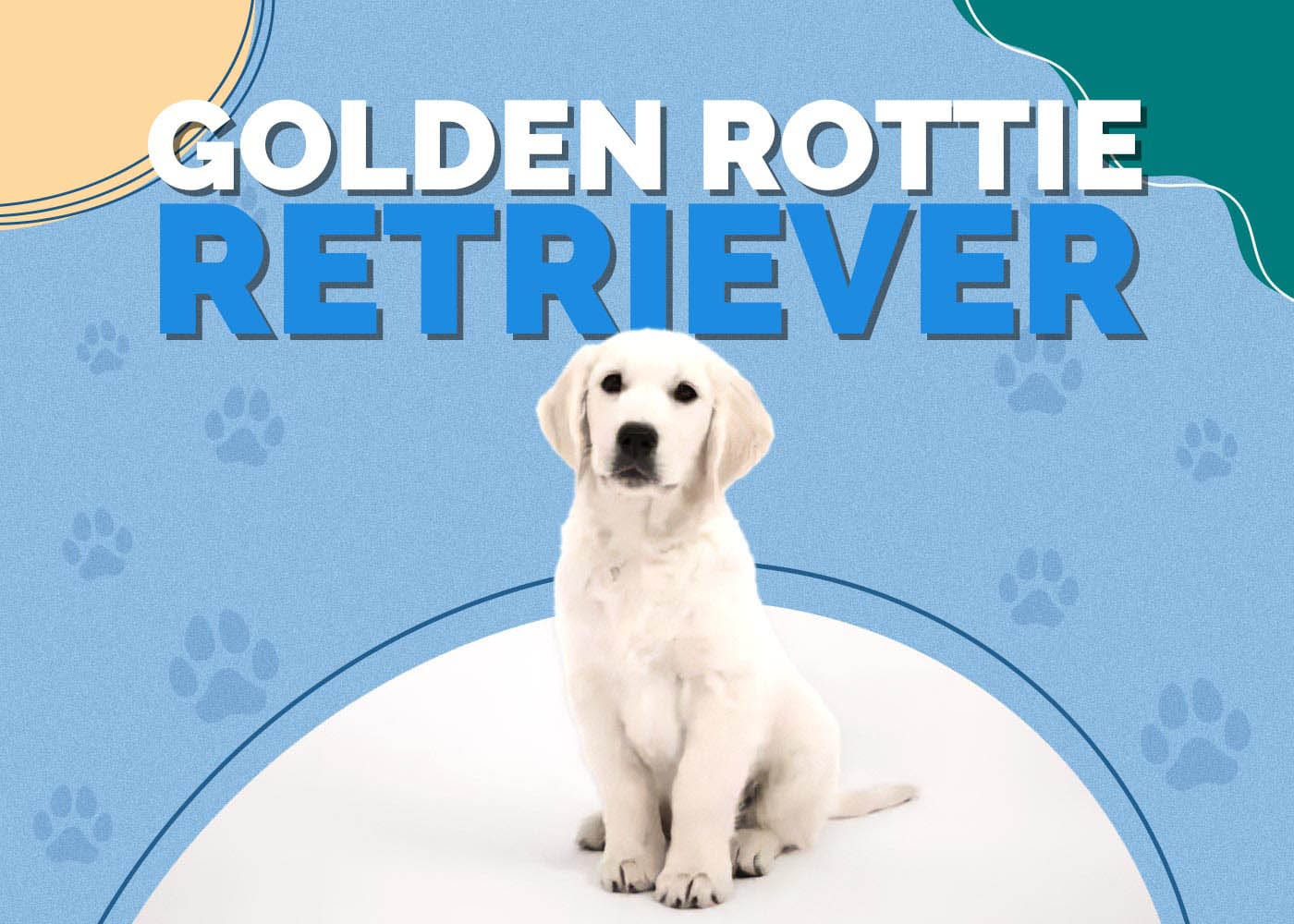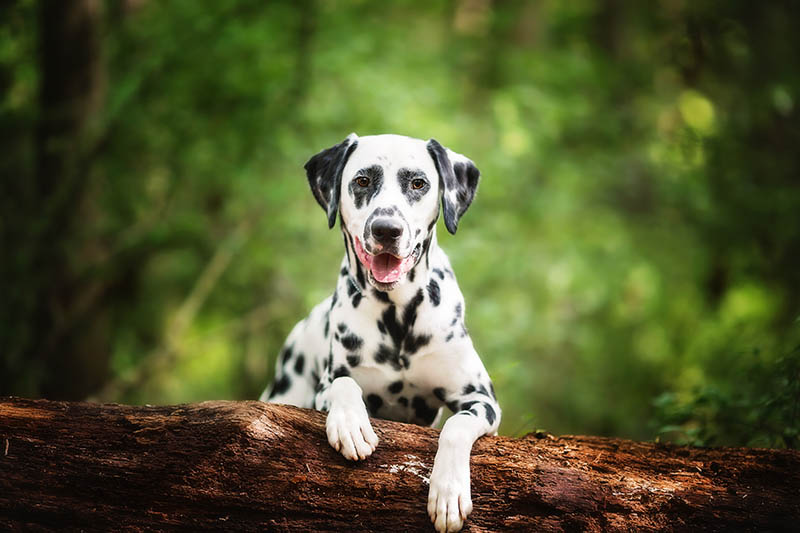Golden Rottie Retriever (Golden Retriever & Rottweiler Mix): Info, Care Guide, Pics

Updated on

| Height: | 24–28 inches |
| Weight: | 70–90 pounds |
| Lifespan: | 10–12 years |
| Colors: | White, blue, silver, red, brown, gray, black |
| Suitable for: | Families who are active with other pets and children, dog owners who are experienced, people who want a watchdog |
| Temperament: | Intelligent, playful, loving, protective |
When you are searching for a fun-loving, energetic, and protective dog that has the best of two breeds in them, you want to choose the Golden Rottie Retriever. Their parents, the Golden Retriever and the Rottweiler, are popular and enjoyable breeds, and when they come together, they truly make something special.
While ideal for active people and families, this mixed breed is best for an experienced dog owner.
Golden Rottie Retriever Puppies
Golden Rottie Retrievers are protective and devoted family dogs, which means they have the best of both of their parents. They get their confident, calm nature from their Rottweiler side and their friendly, gentle personality from their Golden Retriever side.
This active, playful dog is ready to do anything and loves spending time with the family, but they’re also highly alert and always protective. They also will readily bark anytime they hear noises and sense strangers. This is why it’s so important to start socializing your dog when they’re young. Otherwise, they could become very sensitive to new faces and unexpected sounds, barking incessantly and reacting strongly or even becoming aggressive.
However, when you socialize your dog early enough and spend time getting them used to other people and noise, you’ll have a dog that’s friendly to other pets in the family, other dogs, and kids.

Temperament & Intelligence of the Golden Rottie Retriever 🧠
Even though this mix’s temperament can vary from dog to dog, they typically have a wonderful balance of protective and sweet traits. Both Golden Retrievers and Rottweilers have traits that are desirable and not so desirable, though. Some of the less desirable ones are:
- Aggression
- Barking
- Chewing
- Mouthing
- Overprotectiveness
Early socialization and consistent training can help with overcoming any negative traits your dog might have. Your dog might be a bit wary of people they don’t know due to the genes passed on by the Rottweiler parent, but the outgoing and loving personality of the Golden Retriever helps with overcoming this problem.
Since both of the parent breeds are intelligent, your hybrid dog is likely to be very smart and bring you years of fun.
Are These Dogs Good for Families? 🏡
Yes, they can be good for families. They are protective and great with kids.
Does This Breed Get Along With Other Pets? 🐶 😽
Yes, as long as they are socialized early enough.
 Things to Know When Owning a Golden Rottie Retriever:
Things to Know When Owning a Golden Rottie Retriever:
Now that you know some of the basics of having a Golden Rottie and are still thinking of getting one for your family, let’s delve a bit deeper so you know everything that’s involved in having one of these wonderful dogs.
Food & Diet Requirements 🦴
Golden Rottie Retrievers are muscular and active, so you want to make sure that you are giving them a diet that’s full of protein. Since Rottweilers are prone to having issues with bloat, you want to give them meals staggered through the day, rather than allowing your dog to eat anything they want. You shouldn’t plan any heavy activity or exercise for 1 hour after they’ve eaten. These dogs are also prone to having problems with their joints as they get older, so you want to make sure you’re establishing and maintaining the right weight for your dog by not letting them overeat. You also want to make sure that you give them food that’s full of protein but low in carbs. Otherwise, they might be overeating just so they feel full.
Exercise 🐕
Even though Golden Rotties are wonderful indoor companions, you can’t keep them inside all day. They won’t be happy to just go outside to have a short run in the yard either. They need serious exercise. These big dogs need 1–2-hour-long walks, jogs, or runs per day. You can do it all at once or you can do shorter walks. They would also love agility training with a frisbee or ball. This will help keep them mentally stimulated. If you aren’t giving them the exercise that they need, they may become bored and start with destructive behaviors. These can be things like:
- Barking
- Chewing
- Urinating or defecating inside
Another great way that you can give your dog exercise is to take them to a dog park. This will allow them to socialize with some other dogs and get the exercise they need.
- We reviewed the best anti-chew sprays: See our top picks here!
Training 🦮
This hybrid breed has two very intelligent parents. When you combine the affable personality of the Golden Retriever and the ability of the Rottweiler to remember commands without you having to constantly repeat yourself, it’s pretty easy to train the mixed dog. Because they’re large dogs, you want to teach your Golden Rottie Retriever the basics, such as:
- Come
- Down
- Leave it
- Sit
It’s good to teach them as a puppy, since these behaviors are more than a nuisance in big adult dogs. Many people believe that dogs like Rottweilers need “dominance” training. This means you establish yourself as the leader of the pack—not your dog. This kind of training is best achieved by establishing boundaries and rules. You want to reinforce them using a consistent, firm approach.
Many dominant dog breeds simply need jobs that make them feel as if they’re fulfilling their pack role. You can give them a job like carrying a stick, backpack, or ball on your hike or walk. Since the Golden Rottie also has the inborn need to please you, make sure you’re offering them lots of treats and praise when they’ve done something good.
Grooming ✂️
Both Goldens and Rottweilers are seasonal shedders and relatively low maintenance. That said, with the Golden Rottie, you should know that you’re going to have hair constantly appearing on your clothing and furniture. Grooming will help cut down on shedding.
It’s a good idea to brush your dog three times weekly at least, especially with long-haired breeds. Doing this is going to help with removing loose dirt, hair, and tangles that might be on their body. Since Golden Rotties don’t tend to have a bad doggy smell, you only have to bathe them every few months or if they get really dirty.
Besides bathing and brushing, regularly clean their ears and thoroughly dry them after swimming or bathing. Golden Rotties have ears that are folded over, so excess moisture can be trapped easily. This can cause irritations and infections. When you dry their ears thoroughly, you can avoid these issues.
Finally, make sure that you’re clipping their nails every 3 weeks or so. This will help keep their paws snag-free and healthy.
Health and Conditions ❤️
Usually, mixed breeds are healthier than purebreds because crossbreeding can limit or eliminate some known health issues. However, as with any type of crossbreed, your Golden Rottie Retriever may have issues that are common with their parents, the Golden Retriever and Rottweiler.
- Dermatitis
- Cataracts
- Deafness
- Diabetes
- Von Willebrand’s disease
- Elbow dysplasia
- Hip dysplasia
- Retinal dysplasia
- Subaortic stenosis
Male vs. Female
There isn’t a significant difference between the two sexes in this mixed breed, though the males will likely be slightly larger than the females. For both parent breeds, the females don’t tend to get along with each other, so if you want to have two Golden Rotties, you should get ones of the opposite sex. Male Rotties tend to take to training faster, but female Goldens mature faster, so your hybrid may favor one parent over the other or be somewhere in the middle.
3 Little-Known Facts About the Golden Rottie Retriever
1. They Are Big Even as Puppies
Although Golden Rotties often have litters of 8–10 puppies, they aren’t tiny when they are born. These furballs aren’t fragile, and you can gently handle them from birth. You shouldn’t expect that you’re getting something tiny and helpless. You’re getting a playful and adorable hybrid.
2. They Love to Train and Are Great at It
Since the breeds that make up Golden Rotties are both very intelligent, it’s not a surprise that their pups are very smart too. They perform great with training, even when they’re just 3 or so months old.
You can also start socializing them when they’re puppies. This means they’ll quickly become great dogs. It’s best to start introducing other people and animals to the Golden Rotties at 2–4 months old.
3. You Should Control Their Food Intake
Your Golden Rottie might bloat as they get older. That’s why it’s a good idea when you’re starting to feed kibble to your dog to make certain you’re monitoring the amount that they’re eating so they don’t get obese.
They love to overeat and to have access to fatty or carb-loaded snacks. If you don’t control it, it can quickly become a big problem for your pup.
Final Thoughts
If you are ready for the possible health issues, the Golden Rottie may be the dog for you. This lovable dog is eager to please and protect your family. Just make sure that you are keeping them active and socializing them early enough so you’ll have a friendly dog that is great with kids and animals.
Do your research and find a reputable breeder from whom to purchase your puppy. This way, you know what kind of problems the parents have, if any, and you know what possible health problems are in their lineage.
When you open your heart up to a Golden Rottie, you will have a dog that will give you all of the love that you can take.
See also:
Featured Image Credit: (L) Burin P, Shutterstock | (R) Sinseeho, Shutterstock

 Things to Know When Owning a Golden Rottie Retriever:
Things to Know When Owning a Golden Rottie Retriever:









